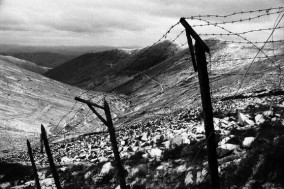Written by William “Chip” Beck
In what seems like only yesterday, but in reality was almost 30 years ago (1984), I helped a Time Magazine crew emerge from the tattered ruins of West Beirut, which during the previous night had fallen from Christian government control into the hands of the Muslim Amal and Druze militias. A few weeks later, the Time Bureau Chief and I coincidentally sat together flying from Cyprus to London.
 During the flight, I mentioned that I wanted to write stories about my six years in the Indochina War (Vietnam, Laos, Cambodia), but I was not sure whether to write fiction or non-fiction. The older and experienced editor, who had excellent instincts and sources, surmised that I was an intelligence officer, but had the courtesy not to press the issue directly. He was a friend of John Le Carré and knew that career spooks had interesting stories to tell, but that they have restrictions on what they can say and how.
During the flight, I mentioned that I wanted to write stories about my six years in the Indochina War (Vietnam, Laos, Cambodia), but I was not sure whether to write fiction or non-fiction. The older and experienced editor, who had excellent instincts and sources, surmised that I was an intelligence officer, but had the courtesy not to press the issue directly. He was a friend of John Le Carré and knew that career spooks had interesting stories to tell, but that they have restrictions on what they can say and how.
His advice to me at the time resonated and stuck with me all these years. “If you write non-fiction,” he said, “you can tell the facts. If you write fiction, you can tell the truth.”
In a very real sense, that is what R. Cyril West has done with his novel, The Thin Wall. The story exposes bits of truth and reality about the suppressed saga of un-repatriated American Prisoners of War (POWs)—ordeals that took place not just in the 1960s, but throughout the 1900s from the end of the Great War well past the end of the Vietnam era.
Scattered among the fictional characters that populate R. Cyril West’s story—which covers real historical events of the 1960s that I remembered as a young Naval Officer──are people that I recognize as real types of operatives and knew about from my last years in the Navy as a POW Special Investigator in the mid-1990s.
 If anyone doubts that Americans were held long past the end of the separate wars in which they fought, and detained secretly by the Soviets and their allies in a 50-60 year span of the 20th century, then the long-term deception operations by the NKVD, GRU, KGB, and SVR is still alive and working today. From 1918 until at least 1979, approximately nine thousand American Soldiers, Sailors, Marines, and Airmen were transported clandestinely from prison camps of the Murmansk Peninsula, Korea, Europe, and Indochina and buried deep in the Gulag Archipelago along with 35 million other Russians and foreign soldiers.
If anyone doubts that Americans were held long past the end of the separate wars in which they fought, and detained secretly by the Soviets and their allies in a 50-60 year span of the 20th century, then the long-term deception operations by the NKVD, GRU, KGB, and SVR is still alive and working today. From 1918 until at least 1979, approximately nine thousand American Soldiers, Sailors, Marines, and Airmen were transported clandestinely from prison camps of the Murmansk Peninsula, Korea, Europe, and Indochina and buried deep in the Gulag Archipelago along with 35 million other Russians and foreign soldiers.
Sometimes telling the immense story about the nine thousand un-repatriated POWs, as I have done with Congressional Committees, Veterans, POW families, and Rolling Thunder, boggles the minds of ordinary citizens and politicians. Relating what happened to many by the telling of one vulnerable prisoner──Gunnery Sergeant Johnston──as R. Cyril West does, can open eyes to a broader truth.
As I write this foreword for my friend Rob, it is Memorial Day, 2013. What readers should remember is that POWs like the one in The Thin Wall were active duty U.S. military personnel until the days when they died, forgotten by a grateful nation, abandoned by the military, yet surviving for years, even decades after the conflicts in which they served had ended for their compatriots on the Home Front. To me, these men are the unsung heroes and non-cataloged veterans of the 20th Century. Their individual stories and collective saga has not been adequately told, properly exposed, or duly recognized by any American administration.
As you read The Thin Wall, think about that. This may be a work of fiction, but it contains far more than just an element of truth in its telling. To honor these lost heroes, America needs to complete the mission by first accepting the truth about them, then exposing it.
Dr. William (Chip) Beck
Commander, USNR (retired)
Arlington, Virginia

The Thin Wall – A cursed woman and a troubled war hero rise up against a tyrant KGB officer in the wake of the 1968 Soviet invasion of Czechoslovakia. At stake: proof American servicemen were secretly transferred to the Soviet Union.
Learn More: Watch Video and Read Historical Background
Order options: Paperback | Kindle Version